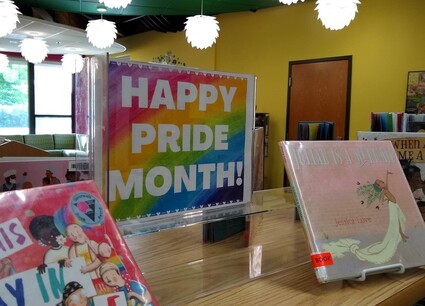At The Library: Library supports intellectual freedom, Pride Month
June 23, 2023
A few months ago, one of our librarians noticed that some of our children's books were taken off a display and randomly placed in the different areas of the children's bookshelves. Sometimes they were placed backwards so we couldn't see the spine labels or hidden behind other books. Other times they were replaced with children's bibles. Those books were exclusively Lesbian, Gay, Bisexual, Transgender, Queer+ (LGBTQ+-inclusive titles.)
June is LGBTQ+ Pride Month. Pride is a joyful celebration of all the identities of the LGBTQ+ community, which was inspired by the Stonewall riots in 1969. To celebrate Pride Month, the library is featuring LGBTQ+ authors, history, characters and voices on our displays throughout June. While some of our patrons told us that they were appreciative of our collection on the subject, we still feel a need to raise awareness and understanding of the topic and intellectual freedom.
In recent years, book challenges and book bans have become a hot topic nationally. In 2022, "a record 2,571 unique titles were targeted for censorship, a 38 percent increase from the 1,858 unique titles targeted for censorship in 2021" according to the American Library Association. Of those titles, the vast majority were written by or about members of the LGBTQ+ community and people of color. The top five of the most challenged books in 2022 are "Gender Queer: A Memoir," by Maia Kobabe; "All Boys Aren't Blue," by George M. Johnson; "The Bluest Eye," by Toni Morrison; "Flamer," by Mike Curato, and "Looking for Alaska," by John Green.
Most of the recent challenges across the country were not local community-driven efforts but were organized by national groups such as the "Hide the Pride" campaign by CatholicVote. The "Hide the Pride" campaign suggests finding a local library's Pride displays and checking out all of them from the display so that nobody else has access to the books. The initiative is framed under the narrative of protecting children's innocence, suggesting that anyone other than adults having access to materials about sexuality, gender identity, and other related topics does harm to the community.
We believe that parents have the right to guide their children's reading and education. Meanwhile, individuals should not be making decisions for other readers or other parents' children. A small group of parents should not dictate what books other people's children are allowed to read.
Our library's Collection Policy on Censorship states that:
The selection of library books and other materials is predicated on the library patrons' right to read, listen to, and view what they wish, as well as their freedom from censorship by others. Many materials are controversial, and any given item may offend some persons. This library will make selections based solely on the merits of the material in relation to the building of the collection and to serving the interests of the library's users, and not on the basis of anticipated approval or disapproval. This library holds censorship to be a purely individual matter. While all patrons are free to reject materials of which they do not approve, they cannot exercise this right of censorship to restrict the freedom of others.
Aside from the policy, we believe young people, especially vulnerable youth who are of historically underrepresented and marginalized groups, deserve to see themselves reflected in books and other mediums, and feel safe and belong in the community. For them, such information and stories can be lifesaving.
George M. Johnson, the author of "All Boys Aren't Blue," stated: "As a Black queer person, I know what it's like to read books that don't tell my story. So in this hunt to 'protect teens' does it ever cross your mind that banning this lifesaving story for LGBTQ students only harms them more? Or do you not care because that's really what this fight is over? Removing LGBTQ stories and Black stories."
Books also serve as tools for better understanding complex and nuanced issues in our society and lives. Limiting young people's access to books does not protect them from life's complex and challenging issues.
Mary Jo Godwin, the final editor of the Wilson Library Bulletin, a professional American magazine published for librarians from 1914 to 1995, once wrote: "A really good library has something in it to offend everyone." That means if a library is truly striving to represent different viewpoints and different moments in history, then you will find materials that you don't agree with. After all, that is the function of a library.
Writer Keiko Satomi is the adult services librarian at the Cloquet Public Library. Email her at [email protected] or call the library at 218-879-1531.








